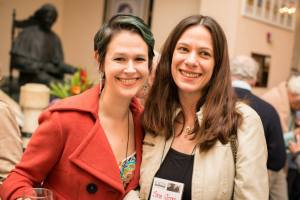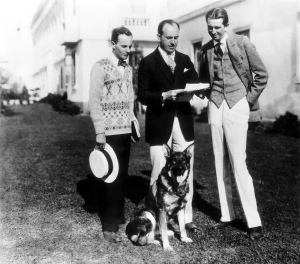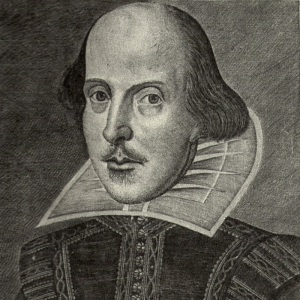 It's always a risk when the Key West Literary Seminar puts on a double session, meaning two separate Seminars two weekends in a row. We want to accommodate as many people as possible, and we're limited by the seats available at the San Carlos Institute. But it's exhausting for the staff and other organizers. And worst of all for those of us with the terrible duty of attending both weekends, it can get repetitive so you feel like you're stuck in some literary version of Groundhog Day.
It's always a risk when the Key West Literary Seminar puts on a double session, meaning two separate Seminars two weekends in a row. We want to accommodate as many people as possible, and we're limited by the seats available at the San Carlos Institute. But it's exhausting for the staff and other organizers. And worst of all for those of us with the terrible duty of attending both weekends, it can get repetitive so you feel like you're stuck in some literary version of Groundhog Day.
To everyone's great relief and delight, this year that did NOT happen. Probably because only one panelist -- James W. Hall -- appeared on both weekends and truly, he's the kind of guy you could listen to tell funny stories all day. The two weekends felt quite different, but both offered illuminating and diverse discussions of crime fiction in its many and varied and forms. Having superstars Lee Child and Michael Connelly in the house for the Final Chapter certainly added to the excitement and they were both great. Child, in particular, was an erudite speaker, who set the tone Friday morning with an entertaining talk about the roots of suspense fiction going back into human history. Evolutionary history.
With Child, Connelly, Lisa Unger, Tess Gerritsen and other big names on board -- and two, count 'em two Edgar nominees for Best Novel (William Kent Krueger and Thomas H. Cook) -- this week might have felt more commercial, to apply an overly broad adjective. Maybe because of that we had less of the old genre-vs.-literary discussion which I am alternately fascinated and bored by (I've got a bunch of links on my Readme page if you feel like delving into it). John Banville, Mr. Literary Himself with a Booker Prize to prove it, said he dislikes the genre stuff and wishes bookshops would shelve everything alphabetically -- mainly because he feels like it ghettoizes literary fiction and consigns it to a dark and forbidding corner. We shelve all the fiction alphabetically at the library, I'm happy to say.
Once again, though, it was the women who really caught my interest -- I've already posted about my bordering-on-embarrassing-fangirldom of Lyndsay Faye, whom I interviewed for Littoral. I had seen Sara Gran last summer at ALA, and she was even smarter and cooler than I remembered. Malla Nunn was a terrific new voice for most of the people in this crowd and her stories of writing about mixed-race people in South Africa as apartheid was being instituted were riveting. Elizabeth George's keynote was great, setting a wonderful tone -- and making me realize that I must have some kind of sick voyeuristic Protestant fascination with hearing about miserable Catholic childhoods. Mary McCarthy, Mary Gordon, Frank McCourt, you name the writer -- I just never get tired of hearing about them. Or reading about them.
I tweeted a lot less this time. Not sure why, but I do know partway through Elizabeth George's keynote I put down my notebook and just allowed myself to sit back and listen -- she was not speaking in tweetable nuggets and I did not want to distract myself by focusing on listening for them.
Coverage of panels and links to audio are available at Littoral, the Seminar's blog. Here are some snippets I did write down:
Elizabeth George:
"Each of us, with very few exceptions, has a darkness within us though mine, admittedly, is probably a little larger than the average individual."
"The darkness from which I write has its genesis in religion and family."
"The Cold War made us wary of perils that we weren't sure we'd recognize if they came knocking on our doors."
"I have to write as I have to breathe, as I have to eat, as I have to drink."
On how the advent of the personal computer with its ease of deleting, adding, moving text allowed her to get over her fear of writing a novel: "It was like being released from an iron maiden."
"A crime novel is a novel that knows where it's going."
"I write about the dark to make sense of things. I look for answers to the whys of life in its most extreme and painful moments."
"The beauty of the crime novel is that it actually knows no bounds."
Lee Child
"The way to tell a story is to not start when the earth cooled."
"Language completely saved our species," and gave us the edge over Neanderthals. "They died out and we didn't because of language."
On how storytelling made it "slightly more likely that you'd be alive next week" and thus become incorporated into human behavior: "The only good it could have done is to be a bit encouraging or empowering or consoling."
"People imagine that thriller fiction and crime fiction as a whole is some kind of side issue. That is completely ass backward." On literary fiction: "You're like the barnacles on our boat. By all means, feel free to ride along. But don't tell me you're more central than we are."
"We love to experience fear and danger and peril as long as we know it's going to be all right."
"When it comes right down to it there are only two kinds of books -- there are books that make you miss your stop on the subway and there are books that don't."
"Reacher is me when I was 9 years old."
On whether he will write books outside the Reacher series: "I'm the guy that writes Reacher and I probably always will be."
"People are way too civilized to admit it but every person has a list of 50 people they would cheerfully shoot in the head."
On the controversial casting of Tom Cruise as Jack Reacher: "I'm incredibly grateful that anybody cares."
"Most people have this unspoken assumption that a book isn't quite enough until it becomes a movie."
His response to people unhappy with the Cruise casting: "I'll make you one promise: Tom Cruise will not come to your house and steal your books."
On the film itself: "I didn't want to see an imitation of what I had done. I wanted to see somebody else's interpretation."
Sara Gran
"I am unhappily and dementedly obsessed with books."
Mystery stories are "our shared secular mythology."
"I love books that are written from a place of compulsion rather than a place of literary ambition."
"I never know what my books are about until they're done."
John Banville
"I feel as if research is the death of fiction." Though his character Quirke is a coroner, Banville has never seen an autopsy: "I just make it up." Imagination, he said, is our most powerful tool. "It's what makes us human, so we should use it as frequently as we can."
"Sex is the only subject that is absolutely impossible to write about. It can't be done."
On writing his Benjamin Black series: "To embark on a frolic of my own at that age seemed like a wonderful thing to do."
"We have this illusion that we are unitary beings. .. We are a collection of poses and attitudes, versions of ourselves … We make ourselves up as we go along. This is what makes life interesting."
On why he writes the crime novels under a pen name: "I didn't want people to think it was an elaborate post-modern joke."
"The greatest invention of humankind is the sentence."
"A relatively happy childhood is a distinct disadvantage."
On how his Roman Catholic upbringing affects his character Quirke: "It's as if he were in an ink bottle and I just poured all that stuff into him."
"The 1950s was a fascinating time in Ireland, a fascinating time in the world. The 1950s was a very dark time, especially in Ireland. It's a wonderful time to set noir fiction."
"We imagine we're these autonomous beings moving through a neutral world. We're not."
"We are the creatures who are constantly aware that we're mortal, that we will die."
Percival Everett
"No one would ever ask John Updike why his characters are white."
"By talking about post-racial America, you've already introduced the topic of race."
On starting a novel: "It's like knowingly entering a bad marriage. You have no good reason to do, but no one can talk you out of it."
"I have a plan for a bestseller. I'm going to write a courtroom drama with vampires on a submarine."
On The Searchers, a movie he uses in a class he teaches about the Western: "It's a movie that at once admits to American racism and practices it."
Tess Gerritsen
"For me, writing is all about finding the monster beneath the mask."
On having her work optioned for TV and movies: "Don't pay attention to Hollywood because it will break your heart. Just cash the checks and walk away."
On her Rizzoli & Isles series: "To me, it's more of a running soap opera with a lot of crime thrown in."
Lisa Unger
"The reason we often turn to crime fiction is not to escape life but to understand it better."
Michael Connelly
"To Kill a Mockingbird is, to me, a legal thriller."
"Almost every time I go away from Harry Bosch I can't wait to start writing about him again."
Michael Koryta
"Using the supernatural was a way for me to alert my family that I have deep-seated mental illnesses."
"I think an absolute genius of suspense is David Sedaris."
Lyndsay Faye
"Character is the only thing that drives my novels."
On research for historical novels: "I sort of cultivate a vitamin D deficiency in the microfilm department of the Bryant Park Research Library."
"We have a certain power now to give voice to people who would have been voiceless at the time."
"Writing Timothy Wilde is not me doing a thought exercise."
"Human nature has not fundamentally changed since the 19th century."
Malla Dunn
"Just because people didn't talk about things in the past doesn't mean they didn't exist."
Recommended Reading
Val McDermid, Place of Execution (recommended by Lee Child, I am 93 percent sure)
David Sedaris, The Santaland Diaries (recommended by Michael Koryta as "a clinic of suspense")
James Sallis' insect series (recommended by Sara Gran)
Michael Chabon, Maps and Legends (recommended by Lyndsay Faye)
Mark Danielewski, House of Leaves (I honestly can't remember who recommended this and I didn't write it down. Bad reporter!)
Michael Koryta, The Apex Predator (a Kindle Single, recommended by Mary Morris)
Tana French, Broken Harbor (recommended by Elizabeth George and Lyndsay Faye -- after which Thomas H. Cook and Michael Koryta who were also on the panel agreed that we should read anything by Tana French)
Suzanne Berne, A Crime in the Neighborhood (recommended by Thomas H. Cook)
Fun Facts
Michael Koryta's novel The Cypress House was inspired by the 1935 Labor Day hurricane that devastated Islamorada.
James W. Hall's first novel Under Cover of Darkness was inspired by the Key Westers who fought against the building of the Reach hotel in the 1980s.
Christine Falls, John Banville's first book published under the name Benjamin Black, started as a TV mini-series that didn't get made. "Every single line of dialogue had to be changed" when it went from script to novel, Banville said.
Jane Rizzoli, from Tess Gerritsen's popular Rizzoli & Isles series, started out as a side character in a medical thriller called The Surgeon. She was supposed to die but Gerritsen found she couldn't kill the character. Dr. Maura Isles, the other half of the team, started out as a charity name, a device authors use to help raise money for nonprofits. They are both what Gerritsen called "accidental characters."
 During this year's Key West Literary Seminar, Percival Everett, who teaches a course on Western movies, described The Searchers as a movie that both "admits to American racism and practices it." I had noticed a recent nonfiction book about the film, and the true story behind it, published last year. Everett's mention, plus the knowledge that we had the movie in the Monroe County Library collection, was enough for me to get hold of both.
The Searchers by Glenn Frankel is an excellent nonfiction book, one of those books that uses a focused lens to examine an important slice of American history. It starts with the story of Cynthia Ann Parker, the real girl whose family was killed in a Comanche raid in Texas. She was kidnapped and, essentially, became Comanche, bearing three children. Some 25 years later, she was recaptured, along with her young daughter, by Americans in a raid on a Comanche camp -- an experience that appears to have been just as traumatic for her as the original kidnapping. She and the young daughter died a few years later. She never saw her teenage sons again.
During this year's Key West Literary Seminar, Percival Everett, who teaches a course on Western movies, described The Searchers as a movie that both "admits to American racism and practices it." I had noticed a recent nonfiction book about the film, and the true story behind it, published last year. Everett's mention, plus the knowledge that we had the movie in the Monroe County Library collection, was enough for me to get hold of both.
The Searchers by Glenn Frankel is an excellent nonfiction book, one of those books that uses a focused lens to examine an important slice of American history. It starts with the story of Cynthia Ann Parker, the real girl whose family was killed in a Comanche raid in Texas. She was kidnapped and, essentially, became Comanche, bearing three children. Some 25 years later, she was recaptured, along with her young daughter, by Americans in a raid on a Comanche camp -- an experience that appears to have been just as traumatic for her as the original kidnapping. She and the young daughter died a few years later. She never saw her teenage sons again.

